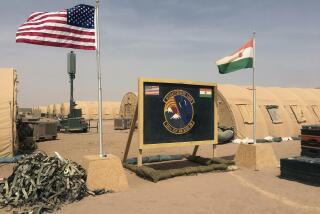Somalia: Stay There Forever? : U.N. and African nations must take the lead
- Share via
Gen. Colin L. Powell, chairman of the Joint Chiefs of Staff, has an answer for Americans who want to know why our troops are in Somalia. “We had a clear objective when we were going in to save lives, get the food moving, control the warlords. We did that and we did it very well,” Powell explained in Washington Tuesday. “ . . . It’s becoming a little more difficult now. . . . But because things get difficult, you don’t cut and run. You work the problem and try to find a correct solution.”
What is the correct solution in Mogadishu? Powell calls for a political solution “led by Somalians with a Somalian police force to keep order.”
Somali fighters, armed with the best weapons that Soviet rubles and American dollars once could buy, shot down a U.S. helicopter Saturday, killing three American soldiers. Those murders have heightened concerns in Washington. President Clinton called Tuesday for a “date certain” for the exit of the 5,000 U.S. troops who are part of the U.N. peacekeeping mission in Somalia. He issued no deadline for that withdrawal, though the Senate wants him to set one by Oct. 15 and the House urges him to seek congressional approval by Nov. 15 to keep troops in Mogadishu. French and Italian troops already plan to leave by the end of the year; they’ve had enough.
Like Clinton, Robert Mugabe, president of Zimbabwe, which also has troops in Somalia under U.N. command, is worried. Mugabe, who in 1980 successfully led one of the smoother transitions to democracy in Africa, thinks the United Nations is making a big error. Zimbabwe’s battalion is in the north, far away from the fighting in Mogadishu; Mugabe believes that African soldiers should be assigned to the war-torn capitol, for they are well equipped to establish rapport with the Somali people and persuade those who are wary of the troops that they are there to help.
Mugabe’s approach represents an African solution to an African problem. His strategy ought to be kept in mind at the United Nations when replacement troops are sent in for American soldiers.
The road to democracy is fraught with danger in Africa, Russia, Bosnia, China and elsewhere. The initial humanitarian effort in Somalia was a success: The United States and other nations compassionately helped thousands of Somali men, women and children avoid death from a famine exacerbated by civil war. But Washington never offered to rebuild the Somalian nation--that’s not what troops do or what the commitment was about. Before long, our soldiers should come home and leave the nation-building to the United Nations. They’ve been in harm’s way long enough. Now the political process, led by the United Nations and some African nations, must kick in.
More to Read
Sign up for Essential California
The most important California stories and recommendations in your inbox every morning.
You may occasionally receive promotional content from the Los Angeles Times.













